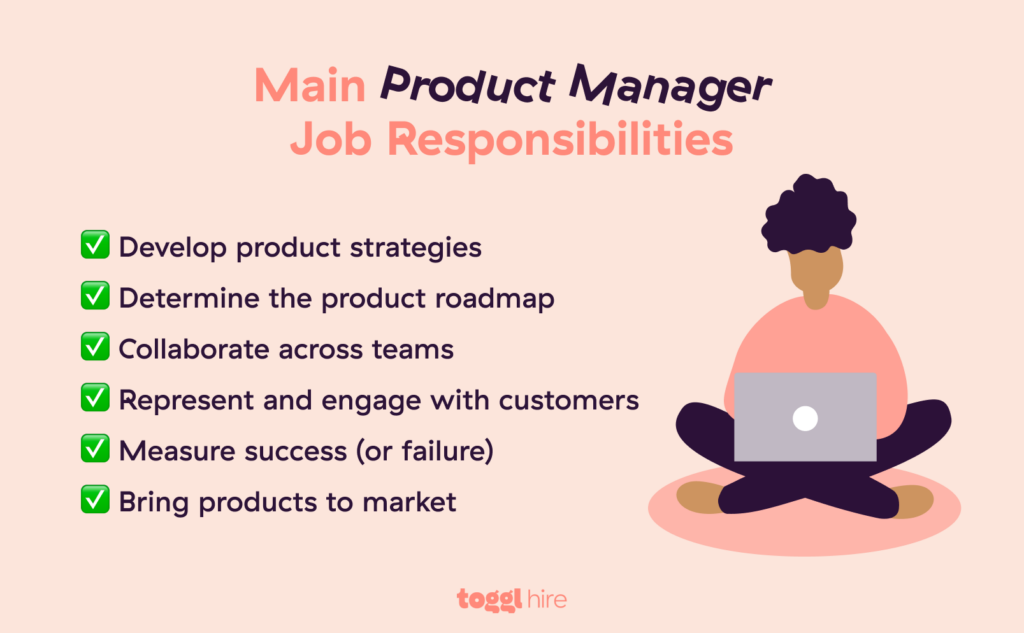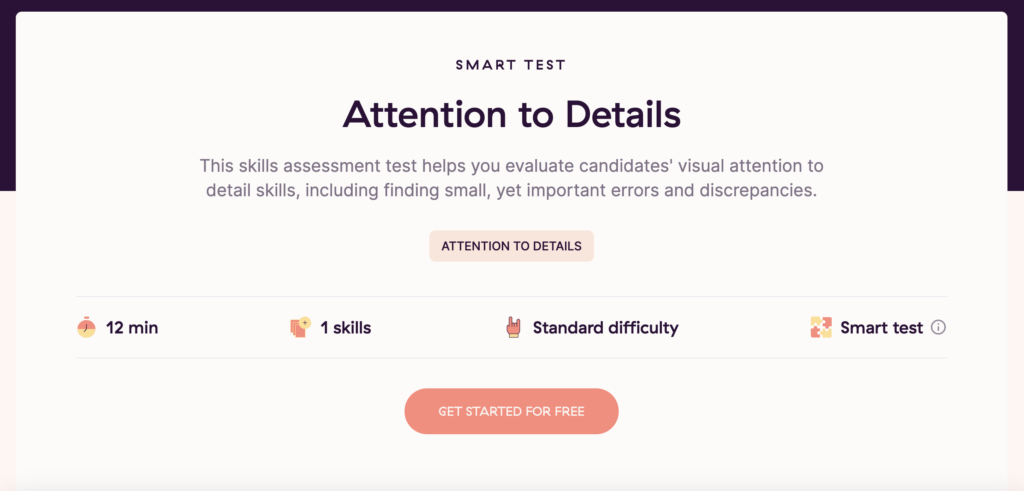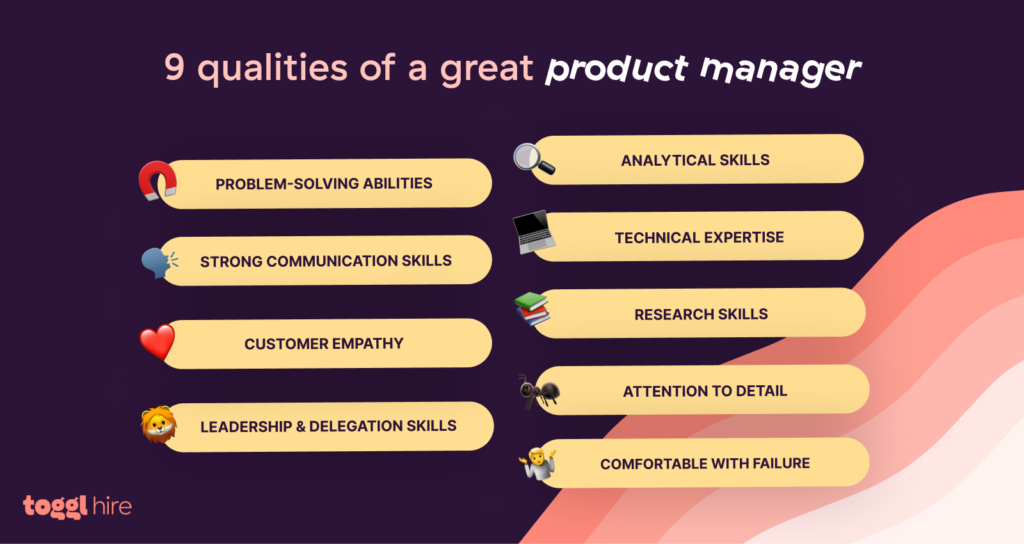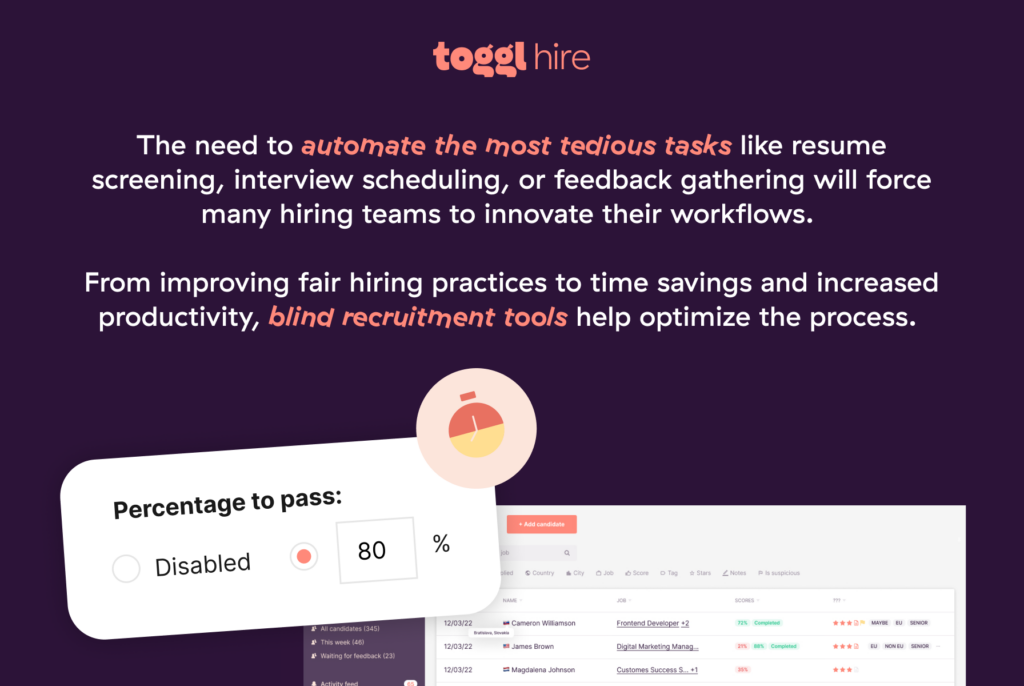Product managers play a pivotal role in ensuring products meet strategic objectives and market needs. Good product managers need analytical skills, world-class organizational abilities, and the charisma to enforce opinions and decisions across departments.
Few people possess all of these skills, making compromise hires depressingly frequent. Strategic recruitment rooted in skills assessments solves these problems.
We know first-hand because we’ve just finished hiring for a product manager at Toggl Hire. We took a creative approach, deploying our skills assessment process (and a few other insider tricks, like a paid test week).
The result is a hire who complements and supports our developers, marketing team, and leadership, allowing us to innovate and expand strategically. You can enjoy similar success — just use this guide to hire a product manager without settling for second best.
TL;DR — Key Takeaways
Product managers oversee product development from inception to product launch. They use research to create a market plan, interview customers to discover user stories, plan product development, and manage product launches.
The diverse range of product management responsibilities demands many different skills and qualities. Desirable qualities include research skills, problem-solving abilities, customer empathy, leadership, and communication.
Product development usually requires specific technical skills as well as general qualities. For example, product management requires analytical skills to detect opportunities, design products, and measure project success. Managers also need technical awareness to communicate with engineers and understand innovation opportunities.
Companies need a systematic approach to hiring product managers. Use many sourcing channels to develop a broad talent pool, structure interviews to assess critical soft and hard skills, and use blind technical or soft skills testing to remove bias and find the ideal candidates.

What is a product manager’s role?
Before recruiting the perfect product manager, it’s important to understand what product managers do and the skill set they require. This knowledge helps set recruitment parameters. After all, when we know what to look for, we have a fighting chance of finding it.
Product managers oversee products from start to finish. They act as the product owner from inception to marketing. The product owner unifies elements of the product development process, ensuring continuity and control. Beyond that broad definition, components of the role include:
Developing product strategies: Product managers carry out market research to determine demand. They research competitors to understand how to create a unique selling point. They interview customers to gauge brand strength and get ideas for services or products. Customer research ensures everyone works towards the same goals: meeting customer needs, maximizing sales, and following the overall business strategy.
Determining the project roadmap: As the product owner, managers define a development pipeline or product roadmap. This map determines the scope of projects and sets milestones for when to build product features. A well-executed roadmap explains how to travel from ideas to sales, supporting everyone involved in the project.
Collaborating across teams: Product managers are exceptional communicators who can collaborate with stakeholders from diverse teams across the entire company. Managers bring together engineers, designers, marketers, strategists, sales teams, and even HR departments. They ensure every action aligns with the overall product strategy.
Representing and engaging with customers: The product manager represents the customer, so products always meet customer needs and provide a high-quality experience. The manager provides development teams with detailed specifications and customer feedback, learning all the time about what clients want and how to serve them better.
Measuring success (or failure): Managers define key performance indicators (KPIs) for each product line, such as unit costs, sales, or customer feedback. They use data productively, deriving valuable insights for future projects.
Bringing products to market: When the development team hands over to marketing, the product manager remains engaged. They oversee product launches across all retail channels, handling press or influencer relationships and constantly checking in with marketing experts. Product managers define the core product message early in the process and embed strategic business requirements at every stage.

9 qualities of a strong product manager
Product management requires a diverse skill set. This diversity makes it challenging to know what qualities or skills to look for. Because of this, companies tend to prioritize a couple of skills or rely on experience.
Simplifying recruitment may work well, but it all too often results in mediocre hires. A product manager with a stellar track record in a different sector may not fit your company culture. Assessing critical skills is a better hiring method, and here are a few especially important ones to hire for.
Problem-solving ability
Solving problems is a daily challenge for product managers. A good product manager is constantly finding new ways to meet customer needs, innovating where necessary but keeping costs low. Creative thinking is an absolute must.
Strong communication skills
A product manager works closely with internal stakeholders from every corner of their organization, and they need the ability to convey their product vision.
Use soft skills tests to assess specific forms of communication. For instance, conflict resolution and negotiation skills are vital in a great product manager, as they must build consensus for ideas, fight for resources, and influence decision-making.
Customer empathy
Customer empathy is a deep understanding of how customers act and feel. Good product manager candidates focus on turning customer desires and needs into real-world products. They don’t just create products because they are neat or clever — their products make a difference in the lives of customers.
Leadership skills and delegation
Product managers are functional team leaders and strategic leaders who champion their product vision to relevant stakeholders.
However, a product manager isn’t usually a formal leadership position (unless you’re recruiting a Chief Product Officer). As a result, companies often overlook leadership when assessing candidate skills.
Strong candidates need to delegate tasks to product team members. That’s fundamental. But they also lead the strategic vision of their team. Product managers keep every product team member motivated and focused on meeting strategic objectives.
Assessing leadership can be tricky. Real-world experience matters, but you can also deploy psychometric testing to identify confident, decisive candidates.
Analytical skills
At the start of the product management pipeline, market research and discovering opportunities rely on data analytics. Later on, managers use complex data analysis to assess project progress and product performance.
When you hire product managers, assess specific skills like data handling alongside creative analytical skills. The best candidates can manage complex data sets, turning raw numbers into exceptional products.
Technical expertise
Product managers are tasked with assessing the technical feasibility of particular projects. They often use their technical background to ask questions like the following to make strategic decisions:
Can product designers deliver sufficient features and performance levels to serve customers?
Can they do so within budget and on time?
Would the product use emerging technology to outpace competitors?
Will product releases lead to successor products delivering future success?
To answer these questions, companies must hire technical talent — people who can communicate with specialists and judge how to use tech effectively.
Testing candidates for specific technical proficiencies is always a good idea. However, remember that technical skills must combine with impressive communication skills. The best product manager candidates can convey complex technical matters to non-technical colleagues.
Research skills
Product management relies on solid research. A development team must prove products will find a market, improve customer experience, and provide a service competitors cannot match. Great product managers know how to find this evidence and can integrate it into effective product strategies.
Attention to detail
Product managers in most businesses juggle many roles, from analyzing exterior conditions to product launches. Every task demands a fine eye for complicated details to avoid costly mistakes and ensure high-quality results.
Testing for attention to detail isn’t always easy. However, hiring teams can use strategically worded interview questions and problem-solving tasks to sift casual candidates from those with laser-like focus.

Being comfortable with failure
The final essential quality to look for when hiring a product manager is the most subtle. Good product management candidates are comfortable with taking risks. The flip side is a relaxed attitude towards failure and a willingness to take responsibility as a product leader.
This quality isn’t the same as being overly casual. Managers must assess risks to make calculated decisions. This skill relates to handling adverse outcomes, which affect even the slickest companies.
Assess this quality via strategic interview questions. Look for candidates who learn from mistakes and use failure to improve their performance. Honesty is a virtue here, and the best product managers understand how over-confidence leads to project failures.

How to hire a product manager
Knowing the essential qualities of a great PM is easy. Assessing candidates to find someone with all of those qualities? That’s much, much harder. But it’s far from impossible with a systematic approach.
Hiring a product manager has two main components.
☝️ Firstly, the sourcing process should capture the attention of suitable candidates.
✌️ Secondly, assessing candidates filters paper standouts from real-world superstars.
Follow the tips below to easily tackle both core challenges.
Perfect your job description
The first task for a hiring manager is writing a product manager job description. The job description should be clear and comprehensive, but it must also be as concise as possible.
This starts with detailing the responsibilities and essential skills. The ideal candidate should know immediately whether their resume and skills match the advertised role.
However, describing your company culture is arguably more important. Product managers shape the cultural fabric of companies and represent and develop brands via innovative products. So it matters a whole lot if they aren’t a good cultural fit.
Highlight benefits or working models that appeal to product management candidates. For instance, product managers can (and often do) work remotely.
Test for technical skills
Given the nature of the product manager role, testing for technical expertise is essential. Make technical assessments the first step in the hiring process.
Placing skills tests at the beginning of the interview process narrows down your search, separating a pool of experts from unsuitable candidates. Create technical skills tests for the role, covering the skills managers need not just to be a successful product manager in general but a successful one at your company.
During the interview process, combine skills tests with strategic questions. For instance, you could ask whether candidates have used a certain application creatively, or you could create scenario-based homework assignments to demonstrate applied competence.
Broaden your talent pool
When hiring product managers, don’t stick to traditional methods. Great candidates emerge from many places, but you never know where that could be. Given this uncertainty, it’s helpful to broaden your talent pool.
Companies must consider potential candidates from diverse backgrounds, taking a creative approach focusing on role-related skills. The right candidate could be working right now as a marketing manager, or they may be a former engineer, ready to switch to product management.
Hiring teams must leverage as many channels as possible to reach the 1% who measure up. Tactics vary from company to company, but options include:
Using online job platforms specializing in product management positions. ProductHQ is a good example, but you could try ProductHired and the Women in Product Career Center.
Get active on product management boards. The online product development community is thriving, so add your company to the conversation on LinkedIn, the Product Management Reddit, or Product Coalition. You should find plenty of interest from active managers.
Bringing in a specialist recruitment agency. Recruiters maintain pools of potential hires and can target individuals to prise them away from market competitors.
Attending product manager industry events. Product management conferences like Mind the Product attract a high quotient of great product managers. Use booths, branding materials, and keynote speeches to build an audience for current roles.

Build a cross-functional interview panel
When hiring a product manager, try to include as many viewpoints as possible. Cross-functional interview panels achieve this by bringing in interviewers from different teams. The result is often a more holistic view of each candidate’s skills and performance.
Marketing professionals may pick up an important insight that engineers miss, and vice versa. Some interviewers are good at verifying competence, while others are attuned to soft skills. All of them are vital when making the right hiring decisions.
Diverse panels don’t just assess candidates effectively, though. They also tend to result in hires who can collaborate across your company. A candidate approved by HR, marketing, analysts, and developers probably has the communication skills to speak across various teams when needed.
Assign a take-home task
Interviews are critical when finding a product manager, but they aren’t everything. Product managers regularly tackle complex assignments involving data collection, analysis, and presentation, and these tasks aren’t easy to assess in person.
Take-home tasks are the ideal way to verify candidates can handle every part of the job. They also assess general problem-solving abilities in a realistic environment — not a stressful, unnatural interview room.

A good approach involves assigning tasks that mirror real-world experience. For example, you might ask candidates to decide between three product designs based on customer feedback and draft a product strategy. Or you could ask applicants to create a progress report for executive stakeholders.
It makes sense to use pre-built tests to make this stage easier. Toggl Hire offers a library of helpful homework assignments. Tasks are standardized and easy to assess, and, most importantly, they reflect on-the-job requirements and cover many business contexts.
Remove hiring biases
Our final recommendation to consider when hiring a product manager applies to every hiring process: eliminate bias and strive for objective decision-making.
Unbiased hiring helps because recruiters focus on talent, not superficial qualities or exaggerated details on a candidate’s resume. However, removing bias isn’t as simple as circulating a memo. You need a systematic strategy to iron out biases and hire for competency.
Using blind hiring techniques is a good starting point. For example, skills tests generate objective results without regard for a candidate’s appearance, dress, gender, or religion.
Phone screening interviews allow you to filter candidates initially without being swayed by surface factors. Recruiting tools can also help by automatically assessing resumes.

However, you shouldn’t automate the entire process. When interviewing candidates in person (or via video), use structured interviews. Every product manager interview should follow a similar format. Interviewers should assess responses on a standard interview scorecard. That way, you can guarantee fair treatment for every interviewee.
Interviewers and assessors should also be aware of the dangers of unconscious bias. Train staff to identify bias and audit interview outcomes to ensure everyone enjoys the same consideration.
Hire a product manager with Toggl Hire
Hiring product managers is much more complex and nuanced than hiring a marketing specialist or account manager. Finding creative candidates with experience and technical chops is never easy.
However, hiring managers is a lot easier with an optimized product management recruitment process. Targeted job descriptions, using multiple sourcing channels, and designing structured interviews all help. But in our view, soft and hard skills tests are the most effective recruitment tools.
Toggl Hire is built to help you assess hires based on skills, not just experience. Our skills test library is available for any organization that wants to follow suit. Create a free account and smarten up your product manager recruitment.

Elizabeth is an experienced entrepreneur, writer, and content marketer. She has nine years of experience helping grow businesses, including two of her own, and shares Toggl's mission of challenging traditional beliefs about what building a successful business looks like.




